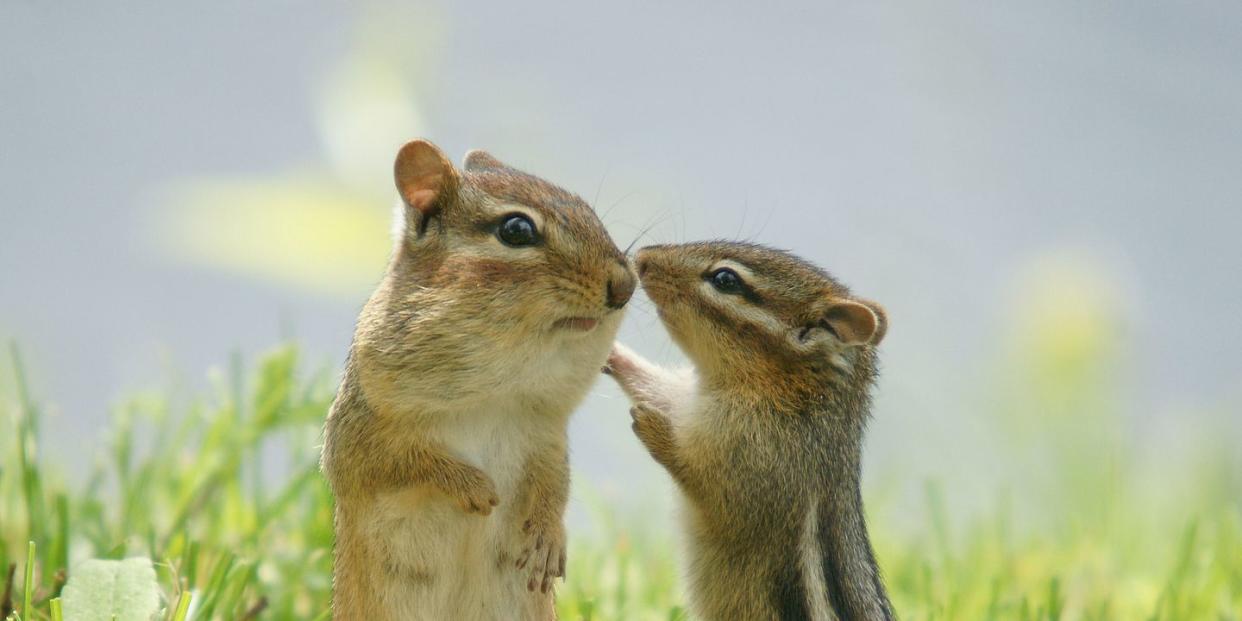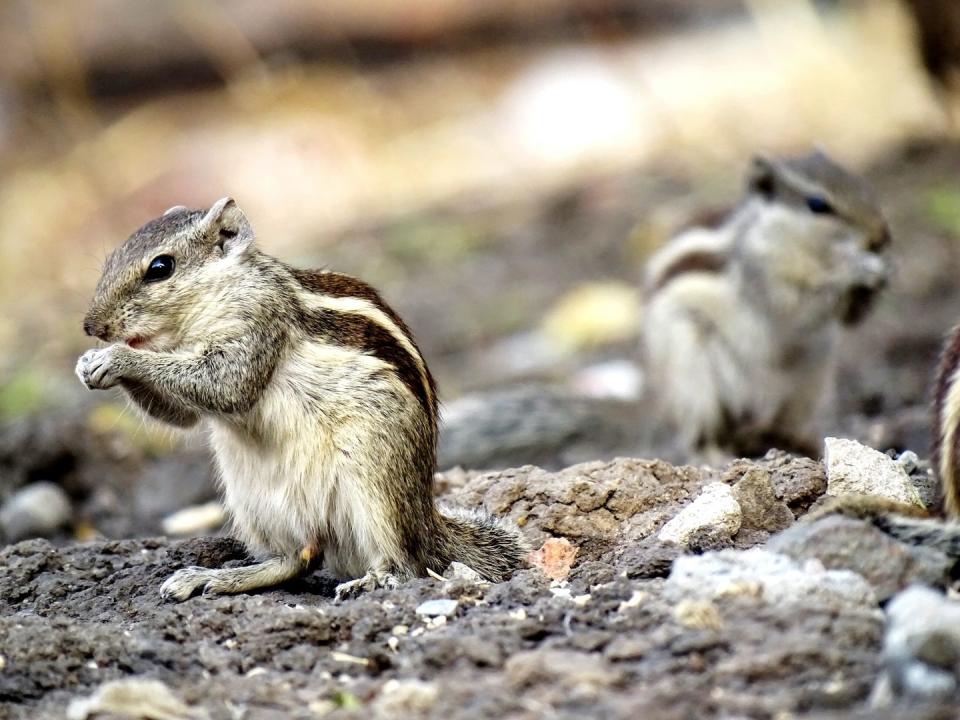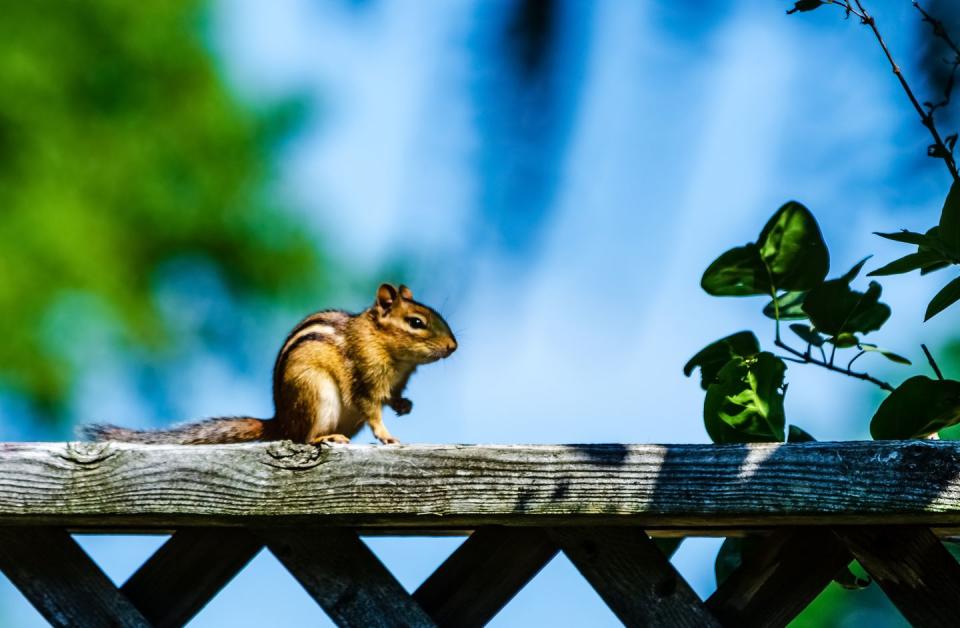Here's Exactly How to Get Rid of Chipmunks Without Harming Them

Sure, they're super cute and it's fun to see them scampering through someone else's yard, but chipmunks can wreak havoc on gardens and yards. These tiny striped rodents love to feast on spring flowering bulbs such as tulip and crocus bulbs, as anyone who's lost a whole garden bed of them can verify. And they're a danger to yards. Chipmunks dig under sidewalks and porches, though they're too small to do any real structural damage, and, like moles, can leave a backyard filled with potholes — an eyesore and a hazard to domestic pets.
If you're looking for ways to get rid of chipmunks, but aren't terribly interested in actually harming them, we've tracked down the best humane ways to evict chipmunks from any property. The following tips should help send any unwanted rodents on their way, whether you're just playing host to one Alvin, or have a huge extended chipmunk family you want to move out.

1. Make Bird Food Unpalatable
The easiest way to urge these tiny members of the squirrel family (Sciuridae) to move it along is by eliminating the things that brought them into your yard in the first place. Begin by placing your bird feeder high off the ground and around 15 feet from fences and other structures. Make sure you regularly clean up spilled seed, and think about using feed with added hot pepper, which birds will eat but chipmunks can't abide.

2. Pepper Your Plants
Speaking of hot pepper, try spraying hot sauce or even pepper spray — carefully! — around the base of your plants to keep chipmunks away. Be warned this may affect pollinators, because the capsaicin in cayenne is toxic to bees. If that's a concern, you might want to sprinkle blood meal or even commercial deer repellent instead. Bulbs and stems coated in thiram (a fungicide and animal repellant found in many garden sprays) work to keep the critters away, or you can always plant posies that chipmunks don't find tasty, like daffodils and allium.

3. Find Natural Repellants
Want to avoid using synthetic, man-made chipmunk repellent on your property? Mothballs act as a natural repellent. Toss them next to your home's foundation, in your garden and even around chipmunk holes. Or ask your hairdresser for clippings and spread them around your garden beds. The human scents from the hair will scare off chipmunks and other animals, while the nitrogen in the hair will fertilize your plants.
4. Get Technical
Electronic repellents, which use blasts of water or ultrasonic vibrations, are a high-tech, non-toxic way to evict chipmunks and other creatures like deer and rabbits from your yard. If you don't feel like spending the money these gadgets cost, go low tech. Inflate beach balls and let them bounce around your backyard in the wind, and hang CDs in your trees, so they can twirl in the breeze. Chipmunks are timid and the unexpected motion will often scare them away.
5. Tidy Up
After treating bird food and protecting your garden, eliminate any other potential food sources, transportation avenues and cover they seek. Remove piles of rocks and wood, as well as shrub and tree clippings, from your property. Prune back plantings from around your home's foundation, and avoid using low rock walls near it. And be sure to toss out branches from berry bushes and fruit trees brought down in the wind.

6. Put up a Barricade
Sometimes the best defense is a good defense. You can prevent chipmunks from burrowing — and make your yard far less enticing to them — by installing L-shaped barriers of mesh fencing or hardware cloth around the base of your house's foundation, fences, sidewalks, porches and more. Use this hardware cloth around garden beds and on top of bulbs, which will sprout right through it. Or purchase bulb cages to keep chipmunks from nibbling on them. Experts say it also helps to surround your home with a gravel border, rather than one created with plants like box shrubs.
7. Trap Humanely
If you've tried everything and your lawn and gardens are still rife with rascally rodents, you might want to buy a humane trap, so you can catch-and-release them in a suitable habitat a few miles away. Generally small traps, from 10 to 20 inches long, and with one or two doors are the way to go. Place them around burrows and the places you've most often seen chipmunks, baiting the traps with goodies like peanut butter or sunflower seeds. Be sure to check the trap often and re-home the animals promptly.
(Be aware that local laws about trapping and relocating wildlife vary. Check the ordinances in your area before attempting to trap chipmunks.)
8. Escort Invaders Out
Upon occasion, a particularly enterprising chipmunk will manage to find its way into your home. If this happens, don't panic. Chances are the little guy is far more frightened (and a lot less irritated) by the whole misadventure than you. Make sure you close all your interior doors, so the critter has nowhere else to go, then open all the exterior doors and windows. Get a blanket and shoo the chipmunk out.
You Might Also Like


